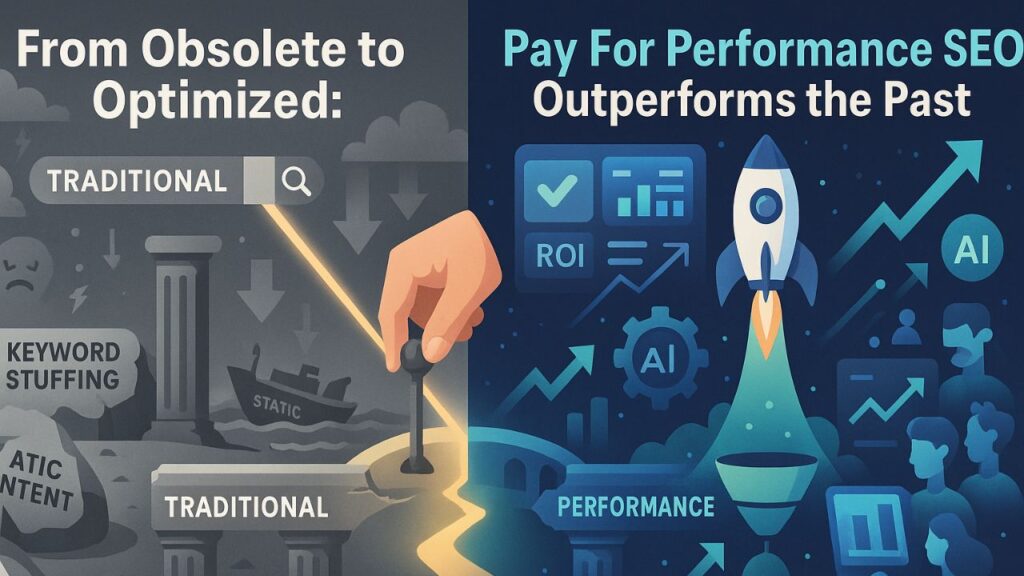Search Engine Optimization (SEO) has long been a cornerstone of digital marketing strategies. Traditionally, businesses have invested in SEO to improve their online visibility, drive organic traffic, and increase conversions. However, the digital landscape is evolving rapidly, and traditional SEO methods are facing significant challenges. In this context, Pay For Performance SEO emerges as a promising alternative, aligning costs with actual results and offering a more accountable approach to search engine marketing.
Table of Contents
The Challenges of Traditional SEO
1. Unpredictable Outcomes
Traditional SEO often involves paying a fixed monthly fee to an agency, regardless of the results achieved. This model can lead to situations where businesses invest substantial resources without seeing commensurate returns. The lack of guaranteed outcomes makes it difficult for companies to justify ongoing expenditures, especially when tangible improvements in rankings or traffic are not evident.
2. Slow Results
SEO is inherently a long-term strategy. Achieving significant improvements in search engine rankings can take several months, depending on various factors such as competition, website authority, and content quality. This delayed gratification can be frustrating for businesses seeking quicker returns on their marketing investments.
3. Algorithm Changes
Search engines like Google frequently update their algorithms to enhance user experience and combat manipulative practices. These changes can negatively impact websites that previously ranked well, leading to sudden drops in traffic and visibility. Traditional SEO strategies may struggle to adapt swiftly to these updates, leaving businesses vulnerable to fluctuations in search rankings.
4. Lack of Transparency
Some SEO agencies may not provide clear insights into their methodologies or the progress of their campaigns. This opacity can make it challenging for businesses to assess the effectiveness of their SEO efforts and understand where their money is going.
Understanding Pay For Performance SEO
Pay For Performance SEO is a results-driven model where businesses pay only when predefined goals are met. Unlike traditional SEO retainers, which charge a fixed monthly fee regardless of performance, this approach ensures that agencies are compensated only when they deliver measurable success .
How It Works
- Goal Setting: Businesses and SEO agencies agree on specific milestones before starting the campaign. These milestones often include:
- Ranking on the first page of search results for targeted keywords within an agreed timeframe.
- A defined increase in organic traffic, such as a 30% growth over six months.
- Boosting lead conversions by improving the quality and intent of organic search visitors.
- Strategy Execution: The agency implements a full-scale SEO strategy, including:
- On-page SEO: Optimizing content, metadata, and internal linking.
- Technical SEO: Enhancing site speed, mobile responsiveness, and structured data.
- Off-page SEO: Link-building, digital PR, and guest blogging.
- Performance Tracking & Payment: Agencies use tools like Google Search Console, Ahrefs, and SEMrush to track ranking improvements and traffic growth. Clients only pay when pre-agreed results are met, reducing upfront financial commitments.
Benefits of Pay For Performance SEO
1. Performance-Based Incentives
Since agencies are only paid when they achieve results, they are highly motivated to deliver success. This model fosters a competitive mindset, encouraging agencies to deploy the best strategies and stay updated with algorithm changes. The focus remains on tangible outcomes, ensuring that every effort contributes to measurable improvements in search rankings and traffic.
2. Lower Upfront Cost
Businesses don’t have to invest heavily upfront, making it a viable option for startups with limited budgets. Instead of committing to hefty monthly retainers, companies can allocate funds strategically, investing only when they see actual progress. This flexibility allows small businesses to compete effectively without financial strain, making SEO accessible to a broader range of enterprises.
3. Potential for Quick Wins
If executed properly, Pay For Performance SEO can yield rapid ranking improvements and increased organic traffic. Since agencies work with performance benchmarks in mind, they often prioritize impactful SEO tactics that generate faster results. This approach benefits businesses looking for immediate visibility boosts, especially in highly competitive markets where early traction can provide a significant edge.
4. Lower Financial Risk
Companies do not have to worry about wasting money on ineffective SEO strategies, as payment is tied to actual results. Unlike traditional SEO models, where success is uncertain despite continuous payments, this model ensures that businesses only invest in strategies that drive meaningful growth. This risk-free structure provides peace of mind and enhances budget efficiency.
5. Increased Agency Accountability
This model holds agencies responsible for their performance, ensuring they focus on delivering measurable success. Since their earnings depend entirely on achieving pre-agreed milestones, agencies are more transparent about their methods, reporting, and strategy execution. This added level of accountability fosters a stronger client-agency relationship built on trust and proven results.
6. ROI-Focused Approach
Unlike traditional SEO retainers, which charge a fixed fee, performance-based SEO is centered on delivering results that impact revenue and business growth. Every SEO effort is geared toward increasing organic conversions, ensuring that businesses don’t just gain rankings but also real financial benefits. This model makes SEO an investment with clear returns rather than a sunk cost.
7. Ideal for Competitive Niches
Companies in highly competitive industries can benefit from a structured, goal-driven SEO approach tailored to their specific needs. Agencies working under this model craft strategies that address niche-specific challenges, leveraging data-driven insights to outperform rivals. Whether in finance, e-commerce, or technology, businesses can achieve sustainable SEO success without the usual uncertainties of long-term investments.
Potential Drawbacks and Considerations

While Pay For Performance SEO offers numerous advantages, it’s essential to consider potential challenges:
1. Short-Term Focus
Some agencies might prioritize quick wins over long-term strategy, potentially neglecting essential elements such as on-site optimization, content quality, and building a strong partnership with the SEO agency. This lack of long-term strategic focus can result in little to no ROI over time .
2. Risk of Black-Hat Tactics
In an effort to achieve results quickly, some agencies might resort to manipulative techniques that violate search engine guidelines. These methods may yield quick results but can ruin your rankings and the entire website’s reputation once detected .
3. Lack of Transparency
Pay-for-performance SEO agencies may use vague pricing policies, making it challenging to understand the true cost of their services. Without transparency, you may end up paying more than expected or receiving subpar service .
4. Limited Availability
Not all SEO providers offer this model, and finding a reputable agency with experience in performance-based SEO may require research .
Conclusion
The digital marketing landscape is evolving, and traditional SEO methods are facing increasing challenges. Pay For Performance SEO offers a compelling alternative by aligning costs with actual results, providing greater accountability, and reducing financial risk. While it’s essential to be aware of potential drawbacks, such as the risk of short-term focus and lack of transparency, the benefits of this model make it a viable option for businesses seeking a more results-driven approach to SEO.
Frequently Asked Questions (FAQ)
Q1: What is Pay For Performance SEO?
A1: Pay For Performance SEO is a results-driven model where businesses pay only when predefined SEO goals are met, such as achieving specific keyword rankings or increasing organic traffic.
Q2: How does Pay For Performance SEO differ from traditional SEO?
A2: Unlike traditional SEO, which involves paying a fixed monthly fee regardless of results, Pay For Performance SEO ties payment to the achievement of specific, measurable outcomes.
Q3: What are the benefits of Pay For Performance SEO?
A3: Benefits include performance-based incentives, lower upfront costs, potential for quick wins, reduced financial risk, increased agency accountability, an ROI-focused approach, and suitability for competitive niches.
Q4: Are there any risks associated with Pay For Performance SEO?
A4: Potential risks include a short-term focus, the use of black-hat tactics, lack of transparency, and limited availability of reputable providers offering this model.
Q5: Is Pay For Performance SEO suitable for all businesses?
A5: While it offers many advantages, businesses should carefully assess their specific needs, goals, and the credibility of the SEO provider before opting for this model.
Q6: How can I ensure the success of a Pay For Performance SEO campaign?
A6: Success can be ensured by setting clear, achievable goals, maintaining open communication with the SEO provider, and regularly monitoring performance metrics to ensure alignment with business objectives.
Q7: Can Pay For Performance SEO guarantee top rankings on search engines?
A7: No reputable SEO provider can guarantee top rankings due to the dynamic nature of search engine algorithms. However, Pay For Performance SEO aligns incentives to achieve the best possible outcomes based on agreed-upon goals.
Q8: How do I choose the right Pay For Performance SEO provider?
A8: Look for providers with a proven track record, transparent practices, and a clear understanding of your industry and business goals. It’s also important to ensure they adhere to ethical SEO practices to avoid potential penalties.



